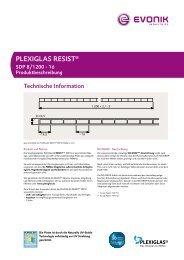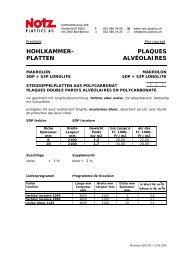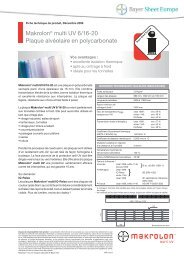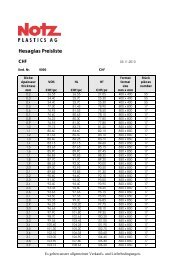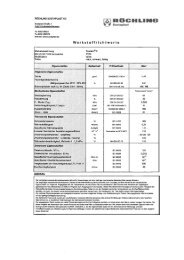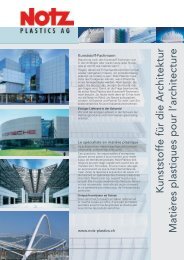Formmassen für Spritzguss und Extrusion ... - Notz Plastics AG
Formmassen für Spritzguss und Extrusion ... - Notz Plastics AG
Formmassen für Spritzguss und Extrusion ... - Notz Plastics AG
- Keine Tags gefunden...
Sie wollen auch ein ePaper? Erhöhen Sie die Reichweite Ihrer Titel.
YUMPU macht aus Druck-PDFs automatisch weboptimierte ePaper, die Google liebt.
<strong>Notz</strong> <strong>Plastics</strong> <strong>AG</strong>, 2009<strong>Formmassen</strong> für <strong>Spritzguss</strong><strong>und</strong> <strong>Extrusion</strong>Matières plastiques de basepour l'injection et l'extrusionGottstattstr. 20b, 2504 Bielwww.notz-plastics.chTel. 032 / 366 74 04Fax 032 / 366 74 38Inhaltsverzeichnis / Table des matièresMarken / MarquesSeite/PageABS Polylac, Tarodur 2SB K-Resin, Kibiton 2MBS Cyrolite, Zylar 3POM Kepital 3PA 6 Taromid B 3PA 6 selbstverl. / ignifuge Taromid B 4PA 66 Taromid A 4PA 66 selbstverl. / ignifuge Taromid A 5PC Wonderlite, Tarolon 5PC-ABS Blend Wonderloy, Taroblend 6PBT Tarolox 10 6PMMA Plexiglas 7PMMI Pleximid 7PPS, PPS Blend Ryton, Xtel (Blend) 7PET Tarolox 111 8PP Borealis, Haiplen 8PP selbstverl. / ignifuge Haiplen 9PE Borealis 9PC-PBT Blend Taroloy 9PS, HIPS Polyrex, Nova, Empera, Styrosun 9SAN Kibisan 10TPE Ponaflex 10SMMA, SMA NAS, Acrystex, Dylark 10DIVERS Reinigungsprodukte 10Produits de nettoyage 10Seite/Page 1
<strong>Formmassen</strong> für <strong>Spritzguss</strong> <strong>und</strong> <strong>Extrusion</strong>Matières plastiques de base pour l’injectionet l’extrusionABSSBABS Acrylnitril-Butadien-StyrolPolylac, TarodurVerarbeitungstemperatur°Ctempérature dupolymère °CWerkzeugtemperatur°Ctempérature dumoule °CTypePolylac standard PA 717C, 737 180 – 230 30 – 70Polylac transparent PA 758 180 – 230 30 – 70Polylac schlagzäh 220 – 250 20 – 60Polylac Galvanotypen PA 727 190 – 250 30 – 80Polylac wärmebeständig 230 – 260 30 – 70Tarodur 100 G3 17% Glasfaser 220 – 250 50 – 80Tarodur 100 K4 20% Glaskugel 220 – 250 50 – 80Tarodur 100 XO V0 selbstverlöschend 210 – 240 50 – 80SB CopolymerK-Resin glasklar hochschlagzähTypeK-Resin KR 01, BK 12 190 – 235 20 – 60K-Resin KR 03, KR 05, BK 11, BK 18 190 – 235 20 – 60K-Resin KK 38 190 – 235 20 – 60K-Resin BK 10, BK 15 190 – 235 20 – 60SB CopolymerKibiton glasklar hochschlagzähTypeKibiton PB-5903 180 – 200 30 – 50Kibiton PB-5910 190 – 210 30 – 50Kibiton PB-5925 190 – 210 30 – 50VortrocknenPré-séchageDichte(spez. Gewicht)densité relativeSchwindung %retrait %max. Temp.Anwendung °Cmax. temp.utilisation °C3 Std. 85°C 1.04 0.40 – 0.70 803 Std. 85°C 1.07 0.40 – 0.70 803 Std. 85°C 1.03 0.40 – 0.80 803 Std. 80°C 1.04 0.40 – 0.70 803 Std. 80°C 1.06 0.40 – 0.70 1003 Std. 80°C 1.17 0.20 – 0.40 753 Std. 80°C 1.11 0.40 – 0.60 753 Std. 80°C 1.18 0.50 – 0.70 751.01 0.30 – 0.70 771.01 0.50 – 1.00 731.00 0.40 – 0.80 621.01 0.40 – 0.80 621.02 0.30 – 0.70 701.02 0.30 – 0.70 701.02 0.30 – 0.70 70Seite/Page 2
<strong>Formmassen</strong> für <strong>Spritzguss</strong> <strong>und</strong> <strong>Extrusion</strong>Matières plastiques de base pour l’injectionet l’extrusionMBSPOMMBS Methylmetacrylat-ButadienstyrolCyrolite, ZylarVerarbeitungstemperatur°Ctempérature dupolymère °CWerkzeugtemperatur°Ctempérature dumoule °CTypeCyrolite G20 190 – 250 40 – 80Cyrolite G20 Hiflo 190 – 230 40 – 80Cyrolite GS90 190 – 230 40 – 80Zylar 220 190 – 210 38 – 54Zylar 530 180 – 200 38 – 54Zylar 631 180 – 200 38 – 54Zylar EX 720 240 – 260 38 – 49POM PolyacetalCopolymer: KepitalHomopolymer: auf AnfrageTypePOM, Copolymer 185 – 220 70 – 110Kepital F10 / F20 / F30 / F40POM, Copolymer 25% Glasfaser 185 – 220 70 – 110Kepital FG 2025Vortrocknenpré-séchageDichte(spez. Gewicht)densité relativeSchwindung %retrait %max. Temp.Anwendung °Cmax. temp.utilisation °C3 – 4 Std. 80°C 1.11 0.30 – 0.60 803 – 4 Std. 80°C 1.11 0.30 – 0.60 803 – 4 Std. 70°C 1.11 0.30 – 0.60 752 Std. 80°C 1.05 0.40 802 Std. 65°C 1.05 0.40 802 Std. 65°C 1.05 0.40 802 Std. 65°C 1.08 0.40 903 – 4 Std. 80°C 1.41 1.80 – 2.20 1103 – 4 Std. 80°C 1.59 0.50 – 0.70 110<strong>Formmassen</strong> für <strong>Spritzguss</strong> <strong>und</strong> <strong>Extrusion</strong>Matières plastiques de base pour l’injectionet l’extrusionPA 6PA 6 PolyamidTaromid BVerarbeitungstemperatur°Ctempérature dupolymère °CWerkzeugtemperatur°Ctempérature dumoule °CTypeTaromid B 280 unverstärkt 220 – 240 70 – 80Taromid B 280 MB Molybdän-Disulfid 220 – 240 70 – 80Taromid B280R3 hochschlagzäh 220 – 250 70 – 80Traomid B280 G3 15% Glasfaser 230 – 250 70 – 90Taromid B280 G4 20% Glasfaser 230 – 250 70 – 80Taromid B280 G6 30% Glasfaser 220 – 250 80 – 110Taromid B280 G7 35% Glasfaser 230 – 260 90 – 120Taromid B280 K6 30% Glaskugel 220 – 250 80 – 100Taromid B280 K10 50% Glaskugel 220 – 260 80 – 100Taromid B280 MT6 30% Mineral 230 – 270 80 – 100Taromid B280 MT8 40% Mineral 230 – 270 80 – 100Vortrocknenpré-séchageDichte(spez. Gewicht)densité relativeSchwindung %retrait %max. Temp.Anwendung °Cmax. temp.utilisation °C3 Std. 80 - 100°C 1.14 1.10 – 1.60 803 Std. 80 - 100°C 1.15 1.30 – 1.60 803 Std. 80 - 100°C 1.10 1.10 – 1.60 803 Std. 80 - 100°C 1.19 – 1.21 0.40 – 1.00 903 Std. 80 - 100°C 1.24 – 1.26 0.40 – 0.50 903 Std. 80 - 100°C 1.34 – 1.36 0.25 – 0.65 1003 Std. 80 - 100°C 1.37 – 1.39 0.20 – 0.60 1003 Std. 80 - 100°C 1.56 0.10 – 0.20 903 Std. 80 - 100°C 1.36 1.10 – 1.20 903 Std. 80 - 100°C 1.36 – 1.38 0.40 – 0.60 703 Std. 80 - 100°C 1.46 – 1.48 0.30 – 0.60 70Seite/Page 3
<strong>Formmassen</strong> für <strong>Spritzguss</strong> <strong>und</strong> <strong>Extrusion</strong>Matières plastiques de base pour l’injectionet l’extrusionPA 6PA 6 Polyamid selbstverl.Taromid BVerarbeitungstemperatur°Ctempérature dupolymère °CWerkzeugtemperatur°Ctempérature dumoule °CTypeTaromid B280 YO V0 halogenfrei 230 – 250 70 – 80Taromid B280 XO UL94 V0 220 – 240 70 – 80Taromid B280 G3 XO V0 15% Glasfaser 230 – 250 80 – 90Taromid B280 G4 XO V0 20% Glasfaser 230 – 250 80 – 100Taromid B280 G5 XO V0 25% Glasfaser 230 – 250 80 – 100Taromid B280 G6 XO V0 30% Glasfaser 230 – 250 80 – 100Vortrocknenpré-séchageDichte(spez. Gewicht)densité relativeSchwindung %retrait %max. Temp.Anwendung °Cmax. temp.utilisation °C3 Std. 80 - 100°C 1.16 – 1.18 1.00 – 1.50 703 Std. 80 - 100°C 1.21 – 1.23 1.00 – 1.50 703 Std. 80 - 100°C 1.27 – 1.29 0.35 – 0.90 803 Std. 80 - 100°C 1.40 – 1.42 0.30 – 0.80 903 Std. 80 - 100°C 1.45 – 1.47 0.30 – 0.80 903 Std. 80 - 100°C 1.56 – 1.58 0.25 – 0.60 90<strong>Formmassen</strong> für <strong>Spritzguss</strong> <strong>und</strong> <strong>Extrusion</strong>Matières plastiques de base pour l’injectionet l’extrusionPA 66PA 66 PolyamidTaromid AVerarbeitungstemperatur°Ctempérature dupolymère °CWerkzeugtemperatur°Ctempérature dumoule °CTypeTaromid A 260 S unverstärkt 250 – 280 70 – 90Taromid A280 HMB3 Molybdän-Disulfid 250 – 280 70 – 90Taromid A280 R3 unverstärkt 250 – 270 70 – 80Taromid A280 MT6 30% Mineral 250 – 280 80 – 100Taromid A280 MT8 40% Mineral 260 – 290 80 – 100Taromid A280 G4 20% Glasfaser 250 – 270 80 – 100Taromid A280 G5 25% Glasfaser 260 – 280 80 – 100Taromid A280 G6 30% Glasfaser 260 – 280 80 – 110Taromid A280 G7 35% Glasfaser 260 – 280 80 – 110Taromid A280 G10 50% Glasfaser 270 – 300 80 – 120Taromid A280 Z1G6 30% Glasfaser +hochschlagzäh 260 – 280 80 – 110Taromid A280 R1 G3 K3 30% Glasfaser+ Glaskugel 250 – 280 70 – 90Vortrocknenpré-séchageDichte(spez. Gewicht)densité relativeSchwindung %retrait %max. Temp.Anwendung °Cmax. temp.utilisation °C3 Std. 80 - 100°C 1.13 – 1.14 1.60 – 2.00 903 Std. 80 - 100°C 1.16 1.40 – 1.80 903 Std. 80 - 100°C 1.08 1.30 – 1.80 903 Std. 80 - 100°C 1.36 – 1.38 0.80 – 1.10 803 Std. 80 - 100°C 1.45 – 1.47 0.40 – 0.60 803 Std. 80 - 100°C 1.24 – 1.26 0.50 – 0.60 1003 Std. 80 - 100°C 1.30 – 1.32 0.40 – 1.40 1003 Std. 80 - 100°C 1.34 – 1.36 0.30 – 1.10 1003 Std. 80 - 100°C 1.37 – 1.39 0.25 – 1.00 1003 Std. 80 - 100°C 1.56 – 1.58 0.15 – 0.50 1103 Std. 80 - 100°C 1.28 – 1.30 0.20 – 0.35 1003 Std. 80 - 100°C 1.34 – 1.36 0.45 – 1.00 90Seite/Page 4
<strong>Formmassen</strong> für <strong>Spritzguss</strong> <strong>und</strong> <strong>Extrusion</strong>Matières plastiques de base pour l’injectionet l’extrusionPA 66PA 66 Polyamid selbstverl.Taromid AVerarbeitungstemperatur°Ctempérature dupolymère °CWerkzeugtemperatur°Ctempérature dumoule °CTypeTaromid A260 YO V0 unverstärkt 250 – 270 70 – 90Taromid A280 XO V0 unverstärkt 260 – 270 70 – 90Taromid A280 G4 XO V0 20% Glasfaser 260 – 270 80 – 100Taromid A280 G5 XO V0 25% Glasfaser 260 – 270 80 – 100Taromid A280 H G6 XO V0 30%Glasfaser 260 – 280 80 – 110Taromid A280 H G6 DXO TR1 V0 30%Glasfaser 260 – 290 80 – 110Taromid A280 H G9 DXO TR1 V0 45%Glasfaser 270 – 300 80 – 110Vortrocknenpré-séchageDichte(spez. Gewicht)densité relativeSchwindung %retrait %max. Temp.Anwendung °Cmax. temp.utilisation °C3 Std. 80 - 100°C 1.16 – 1.18 1.00 – 2.50 803 Std. 80 - 100°C 1.27 – 1.34 1.20 – 2.50 903 Std. 80 - 100°C 1.40 – 1.42 0.40 – 0.90 903 Std. 80 - 100°C 1.46 – 1.48 0.35 – 0.90 903 Std. 80 - 100°C 1.56 – 1.58 0.30 – 0.75 1303 Std. 80 - 100°C 1.56 – 1.58 0.30 – 0.75 1303 Std. 80 - 100°C 1.61 – 1.63 0.15 – 0.50 130<strong>Formmassen</strong> für <strong>Spritzguss</strong> <strong>und</strong> <strong>Extrusion</strong>Matières plastiques de base pour l’injectionet l’extrusionPCPC PolycarbonatWonderlite, TarolonVerarbeitungstemperatur°Ctempérature dupolymère °CWerkzeugtemperatur°Ctempérature dumoule °CTypeWonderlite PC-110 glasklar 240 – 320 70 – 120Wonderlite PC-115 glasklar 240 – 320 70 – 120Wonderlite PC-122 glasklar 240 – 320 70 – 120Wonderlite PC-175 glasklar Optical 280 – 385 45 – 128Wonderlite PC-110N V0 halogenfrei 240 – 320 70 – 120Wonderlite PC-110U UV-stabilisiert 240 – 320 70 – 120Tarolon 2500 G2 V1 10% Glasfaser 260 – 300 100 – 120Tarolon 2500 G4 V1 20% Glasfaser 260 – 300 100 – 120Tarolon 2500 G6 V1 30% Glasfaser 260 – 300 100 – 120Tarolon 3000 W YO V0 transparenthalogenfrei selbstverlöschend 250 – 290 90 – 110Tarolon 2500 W XO V0 transparentselbstverlöschend 250 – 290 90 – 110Tarolon 2500 W G2 XO V0 10%Glasfaser selbstverlöschend 250 – 290 100 – 120Tarolon 2500 W G4 XO V0 20%Glasfaser selbstverlöschend 250 – 290 100 – 120Tarolon 2500 W G6 XO V0 30%Glasfaser selbstverlöschend 250 – 290 100 – 120Vortrocknenpré-séchageDichte(spez. Gewicht)densité relativeSchwindung %retrait %max. Temp.Anwendung °Cmax. temp.utilisation °C4 Std. 120°C 1.20 0.50 – 0.70 1204 Std. 120°C 1.20 0.50 – 0.70 1204 Std. 120°C 1.20 0.50 – 0.70 1204 Std. 120°C 1.20 0.50 – 0.70 1204 Std. 120°C 1.20 0.50 – 0.70 1404 Std. 120°C 1.20 0.50 – 0.70 1203 Std. 120-130°C 1.24 – 1.26 0.30 – 0.50 1303 Std. 120-130°C 1.33 – 1.35 0.30 – 0.50 1353 Std. 120-130°C 1.42 – 1.44 0.10 – 0.30 1353 Std. 120-130°C 1.20 0.50 – 0.70 1203 Std. 120-130°C 1.22 – 1.24 0.50 – 0.70 1203 Std. 120-130°C 1.26 – 1.28 0.30 – 0.70 1303 Std. 120-130°C 1.35 – 1.37 0.25 – 0.75 1303 Std. 120-130°C 1.44 – 1.46 0.15 – 0.40 130Seite/Page 5
<strong>Formmassen</strong> für <strong>Spritzguss</strong> <strong>und</strong> <strong>Extrusion</strong>Matières plastiques de base pour l’injectionet l’extrusionPC-ABSBlendPC-ABS BlendTaroblend, WonderloyVerarbeitungstemperatur°Ctempérature dupolymère °CWerkzeugtemperatur°Ctempérature dumoule °CTypeTaroblend 45 - 45% PC 225 – 250 50 – 70Taroblend 65 - 65% PC 230 – 260 50 – 70Taroblend 85 - 85% PC 230 – 270 50 – 70Taroblend 88 G2 10% Glasfaser 240 – 270 80 – 100Taroblend 88 G4 20% Glasfaser 240 – 270 80 – 100Taroblend 65 XO V0 selbstverlöschend 230 – 250 50 – 70Taroblend 85 XO V0 selbstverlöschend 230 – 260 50 – 70Wonderloy PC-510 200 – 260 40 – 60Wonderloy PC-540 200 – 260 40 – 60Wonderloy PC-345 200 – 260 50 – 100Wonderloy PC-365 wärmestabilisiert,schlagzäh 200 – 260 50 – 100Wonderloy PC-385 wärmestabilisiert,hochschlagzäh 200 – 260 50 – 100Vortrocknenpré-séchageDichte(spez. Gewicht)densité relativeSchwindung %retrait %max. Temp.Anwendung °Cmax. temp.utilisation °C3 Std. 80 - 100°C 1.11 – 1.13 0.40 – 0.70 803 Std. 80 - 100°C 1.13 – 1.15 0.40 – 0.70 903 Std. 80 - 100°C 1.14 – 1.16 0.40 – 0.70 1003 Std. 80 - 100°C 1.19 – 1.21 0.20 – 0.40 1003 Std. 80 - 100°C 1.24 – 1.26 0.20 – 0.40 1003 Std. 80 - 100°C 1.18 – 1.20 0.40 – 0.70 853 Std. 80 - 100°C 1.20 0.40 – 0.70 803 – 4 Std. 85°C 1.16 0.40 – 0.60 1003 – 4 Std. 90°C 1.18 0.40 – 0.60 1004 Std. 100°C 1.10 0.40 – 0.60 1004 Std. 100°C 1.13 0.40 – 0.60 1104 Std. 100°C 1.14 0.40 – 0.60 120<strong>Formmassen</strong> für <strong>Spritzguss</strong> <strong>und</strong> <strong>Extrusion</strong>Matières plastiques de base pour l’injectionet l’extrusionPBTPBT PolybutylenterephthalatTarolox 10Verarbeitungstemperatur°Ctempérature dupolymère °CWerkzeugtemperatur°Ctempérature dumoule °CTypeTarolox 10 W unverstärkt 230 – 250 60 – 80Tarolox 10 G2 10% Glasfaser 240 – 260 80 – 110Tarolox 10 G4 20% Glasfaser 240 – 260 80 – 110Tarolox 10 G6 30% Glasfaser 250 – 270 80 – 110Tarolox 10 XO V0 unverstärkt 230 – 250 60 – 80Tarolox 10 G3 XO V0 15% Glasfaser 230 – 250 80 – 110Tarolox 10 G4 XO V0 20% Glasfaser 230 – 260 80 – 110Tarolox 10 G4 DXO3 V0 20% Glasfaser 230 – 260 80 – 110Tarolox 10 H G6 XO V0 30% Glasfaser 230 – 270 80 – 110Tarolox 10 H G6 DXO V0 30%Glasfaser 230 – 270 80 – 110Tarolox 10 Z1 G4 20% Glasfaserschlagzäh 240 – 260 80 – 110Tarolox 10 MT4 G6 30% Glasfaser +20% Mineral 250 – 270 80 – 110Vortrocknenpré-séchageDichte(spez. Gewicht)densité relativeSchwindung %retrait %max. Temp.Anwendung °Cmax. temp.utilisation °C3 Std. 120-130°C 1.30 – 1.32 1.60 – 1.80 903 Std. 120-130°C 1.37 – 1.39 0.70 – 1.30 903 Std. 120-130°C 1.45 – 1.47 0.40 – 1.00 903 Std. 120-130°C 1.52 – 1.54 0.25 – 1.00 1003 Std. 120-130°C 1.41 – 1.43 1.50 – 2.00 903 Std. 120-130°C 1.52 – 1.54 0.50 – 1.00 903 Std. 120-130°C 1.57 – 1.59 0.40 – 0.90 903 Std. 120-130°C 1.51 – 1.53 0.40 – 0.90 903 Std. 120-130°C 1.64 – 1.66 0.20 – 0.60 1403 Std. 120-130°C 1.64 – 1.66 0.20 – 0.60 1403 Std. 120-130°C 1.44 – 1.46 0.40 – 1.00 903 Std. 120-130°C 1.70 – 1.72 0.25 – 0.90 100Seite/Page 6
<strong>Formmassen</strong> für <strong>Spritzguss</strong> <strong>und</strong> <strong>Extrusion</strong>Matières plastiques de base pour l’injectionet l’extrusionPMMAPMMIPMMA PolymethylmethacrylatPlexiglasVerarbeitungstemperatur°Ctempérature dupolymère °CWerkzeugtemperatur°Ctempérature dumoule °CTypePlexiglas 6N 220 – 250 50 – 70Plexiglas 7N / 7H / 7M 220 – 250 60 – 80Plexiglas 8N / 8H 220 – 250 70 – 90Plexiglas zk 20 schlagzäh 220 – 250 50 – 70Plexiglas zk 30 schlagzäh 220 – 250 50 – 70Plexiglas zk 40 schlagzäh 220 – 250 50 – 70Plexiglas zk 50 schlagzäh 220 – 250 50 – 70Plexiglas zk 3BR schlagzäh 220 – 250 50 – 80Plexiglas zk 4BR schlagzäh 220 – 250 50 – 80Plexiglas zk 5BR schlagzäh 220 – 250 50 – 80Plexiglas zk 6BR schlagzäh 220 – 250 50 – 80Plexiglas hw 55hochwärmeformbeständig 220 – 250 60 – 90Plexaloy f-PAB schlagzäh 220 – 250 50 – 80Plexiglas df21, df22, df23 lichtstreuend 220 – 250 60 – 90PMMI PolymethacrylmethylimidPleximidTypePlex 8805 240 – 290 100 – 130Plex 8813 250 – 280 80 – 100Plex 8817 240 – 290 120 – 150Vortrocknenpré-séchageDichte(spez. Gewicht)densité relativeSchwindung %retrait %max. Temp.Anwendung °Cmax. temp.utilisation °C4 Std. 80°C 1.19 0.20 – 0.50 824 Std. 90°C 1.19 0.20 – 0.50 904 Std. 100°C 1.19 0.30 – 0.60 984 Std. 90°C 1.17 0.40 – 0.60 904 Std. 90°C 1.15 0.40 – 0.70 904 Std. 85°C 1.13 0.50 – 0.80 904 Std. 70°C 1.12 0.60 – 0.90 904 Std. 90°C 1.19 0.30 – 0.60 904 Std. 90°C 1.18 0.30 – 0.60 904 Std. 90°C 1.17 0.40 – 0.70 904 Std. 85°C 1.16 0.40 – 0.70 904 Std. 110°C 1.19 0.40 – 0.70 1104 Std. 85°C 1.19 0.40 – 0.70 904 Std. 90°C 1.19 0.20 – 0.60 904 Std. 130°C 1.21 0.50 1404 Std. 150°C 1.21 0.40 1604 Std. 150°C 1.21 0.40 160<strong>Formmassen</strong> für <strong>Spritzguss</strong> <strong>und</strong> <strong>Extrusion</strong>Matières plastiques de base pour l’injectionet l’extrusionPPSPPS BlendPPS PolyphenylensulfidRyton, Xtel (Blend)Verarbeitungstemperatur°Ctempérature dupolymère °CWerkzeugtemperatur°Ctempérature dumoule °CTypeRyton R 4 Glasfaser 315 – 335 130 – 150Ryton R 4 XT Glasfaser 315 – 335 130 – 150Ryton R 7-120 Glasfaser-Mineral 315 – 335 130 – 150Ryton BR 111 Glasfaser-Mineral 315 – 335 130 – 150Ryton BR 42 mit PTFE 315 – 335 130 – 150Ryton R 4 200 Glasfaser 315 – 335 130 – 150Ryton R 4 220 Glasfaser 315 – 335 130 – 150Ryton R 4 230 Glasfaser 315 – 335 130 – 150Ryton R 10 110 Glasfaser-Mineral 315 – 335 130 – 150Ryton P4-60 unverstärkt (<strong>Spritzguss</strong>) 300 – 325 120 – 150Ryton R-6-010 unverstärkt (<strong>Extrusion</strong>) 300 – 325 120 – 150Ryton V1, PR11-10 PulverXtel XK 2040 Glasfaser 290 – 305 80 – 135Xtel XK 2240 Glasfaser 290 – 305 80 – 135Xtel XK 2760 Glasfaser-Mineral 290 – 305 80 – 135Xtel XE 3200 unverstärkt 290 – 305 80 – 135Xtel XE 3035 Glasfaser 290 – 305 80 – 135Vortrocknenpré-séchageDichte(spez. Gewicht)densité relativeSchwindung %retrait %max. Temp.Anwendung °Cmax. temp.utilisation °C2 – 4 Std. 150°C 1.65 0.30 – 0.50 2202 – 4 Std. 150°C 1.65 0.30 – 0.50 2202 – 4 Std. 150°C 1.95 0.20 – 0.60 2402 – 4 Std. 150°C 1.95 0.20 – 0.60 2402 – 4 Std. 150°C 1.75 0.20 – 0.60 1802 – 4 Std. 150°C 1.65 0.30 – 0.50 2202 – 4 Std. 150°C 1.65 0.30 – 0.50 2202 – 4 Std. 150°C 1.65 0.20 – 0.50 2202 – 4 Std. 150°C 2.05 0.20 – 0.40 2402 – 4 Std. 150°C 1.35 1.10 – 1.60 2002 – 4 Std. 150°C 1.35 1.10 – 1.60 2004 – 6 Std. 80°C 1.70 0.30 – 0.50 1504 – 6 Std. 80°C 1.55 0.30 – 0.60 1504 – 6 Std. 80°C 1.80 0.20 – 0.50 1504 – 6 Std. 110°C 1.15 2.5 1504 – 6 Std. 110°C 1.45 0.20 – 0.50 150Seite/Page 7
<strong>Formmassen</strong> für <strong>Spritzguss</strong> <strong>und</strong> <strong>Extrusion</strong>Matières plastiques de base pour l’injectionet l’extrusionPETPET PolyethylenterephthalatTarolox 111Verarbeitungstemperatur°Ctempérature dupolymère °CWerkzeugtemperatur°Ctempérature dumoule °CTypeTarolox 111 G6 30% Glasfaser 270 – 300 90 – 130Tarolox 111 G9 45% Glasfaser 270 – 300 90 – 130Tarolox 111 G4 DXO V0 20% Glasfaser 260 – 290 90 – 130Tarolox 111 G6 DXO V0 30% Glasfaser 260 – 290 90 – 130Tarolox 111 G4 DXO3 V0 20%Glasfaser 260 – 290 100 – 130Tarolox 111 G5 DXO3 V0 25%Glasfaser 260 – 290 100 – 130Tarolox 111 G6 DXO3 30% Glasfaser 260 – 290 100 – 130Vortrocknenpré-séchageDichte(spez. Gewicht)densité relativeSchwindung %retrait %max. Temp.Anwendung °Cmax. temp.utilisation °C3 Std. 110-130°C 1.55 – 1.57 0.20 – 0.70 1403 Std. 110-130°C 1.68 – 1.70 0.15 – 0.60 1403 Std. 110-130°C 1.58 – 1.60 0.30 – 1.00 1403 Std. 110-130°C 1.66 – 1.68 0.20 – 0.70 1503 Std. 110-130°C 1.56 – 1.58 0.30 – 1.00 1403 Std. 110-130°C 1.60 – 1.62 0.25 – 0.90 1403 Std. 110-130°C 1.62 – 1.64 0.20 – 0.80 140<strong>Formmassen</strong> für <strong>Spritzguss</strong> <strong>und</strong> <strong>Extrusion</strong>Matières plastiques de base pour l’injectionet l’extrusionPPPP HomopolymerPP CopolymerBorealis, HaiplenVerarbeitungstemperatur°Ctempérature dupolymère °CWerkzeugtemperatur°Ctempérature dumoule °CTypeHomopolymer 200 – 260 20 – 70Copolymer 200 – 260 20 – 70Haiplen H50 C6 30% CaCo 3 190 – 220 40 – 60Haiplen H50 T4 20% Talkum 190 – 220 30 – 50Haiplen H50 T8 40% Talkum 190 – 220 50 – 70Haiplen H90 T8 40% Talkum 190 – 210 40 – 60Haiplen EP70 C5 25% CaCo 3 190 – 220 40 – 60Haiplen EP90 T8 40% Talkum 200 – 220 40 – 60Haiplen EP30 P15 75% Bariumsulfat 180 – 200 40 – 60Haiplen H30 G4 20% Glasfaser 220 – 250 50 – 70Haiplen H30 G6 30% Glasfaser 220 – 250 50 – 70Haiplen H30 G4 BA 20% Glasfaser CB 220 – 250 50 – 70Haiplen H30 G6 BA 30% Glasfaser CB 220 – 250 50 – 70HaiplenH30 G10 BA 50% Glasfaser CB 220 – 260 50 – 70Haiplen EP30 Z1 G6 BA 30%Glasfaser CB 210 – 240 40 – 60Haiplen EP100 K10 BA 50%Glaskugel CB 200 – 220 40 – 60Vortrocknenpré-séchageDichte(spez. Gewicht)densité relativeSchwindung %retrait %max. Temp.Anwendung °Cmax. temp.utilisation °C0.91 0.80 – 2.00 800.90 0.80 – 2.00 801 Std. 70 – 80°C 1.12 1.10 801 Std. 70 – 80°C 1.05 1.10 801 Std. 70 – 90°C 1.24 0.90 801 Std. 70 – 90°C 1.24 0.90 801 Std. 70 – 80°C 1.08 1.10 751 Std. 70 – 80°C 1.24 0.90 753 Std. 70 – 90°C 2.10 – 2.20 0.50 753 Std. 70 – 90°C 1.05 0.60 1003 Std. 70 – 90°C 1.13 0.50 1203 Std. 70 – 90°C 1.05 0.60 1003 Std. 70 – 90°C 1.13 0.50 1103 Std. 70 – 90°C 1.35 0.40 1103 Std. 70 – 80°C 1.13 0.50 1003 Std. 70 – 80°C 1.35 1.10 100Seite/Page 8
<strong>Formmassen</strong> für <strong>Spritzguss</strong> <strong>und</strong> <strong>Extrusion</strong>Matières plastiques de base pour l’injectionet l’extrusionPPPEPP selbstverlöschendHaiplenVerarbeitungstemperatur°Ctempérature dupolymère °CWerkzeugtemperatur°Ctempérature dumoule °CTypeHaiplen H50 YO V0 unverstärkt 190 – 220 40 – 60Haiplen H50 T4 XO V0 20% Talk 190 – 210 40 – 60Haiplen H30 G6 BA XO V0 30%Galsfaser CB 200 – 220 40 – 60Haiplen H50 X2 V2 unverstärkt 180 – 200 30 – 50Haiplen EP60 X2 V2 unverstärkt 180 – 210 30 – 50Haiplen EP50 T2 X2 V2 10% Talk 180 – 200 30 – 50Vortrocknenpré-séchageDichte(spez. Gewicht)densité relativeSchwindung %retrait %max. Temp.Anwendung °Cmax. temp.utilisation °C3 Std. 70 – 90°C 1.05 1.00 903 Std. 70 – 90°C 1.33 1.10 1003 Std. 70 – 90°C 1.45 0.20 1101 Std. 70 – 90°C 0.95 1.30 801 Std. 70 – 90°C 0.95 1.30 751 Std. 70 – 90°C 1.03 1.10 80PE HD / PE LDBorealisTypeBorealis HD 200 – 270 20 – 50Borealis LD 180 – 260 20 – 500.954 – 0.964 1.30 – 2.50 700.920 – 0.927 1.50 – 2.50 60<strong>Formmassen</strong> für <strong>Spritzguss</strong> <strong>und</strong> <strong>Extrusion</strong>Matières plastiques de base pour l’injectionet l’extrusionPC-PBT BlendPSHIPSPC-PBT BlendTaroloyVerarbeitungstemperatur°Ctempérature dupolymère °CWerkzeugtemperatur°Ctempérature dumoule °CTypeTaroloy 10 unverstärkt 240 – 280 80 – 110Taroloy 50 unverstärkt 240 – 260 80 – 110Taroloy 50 Z1 unverstärkt 240 – 260 80 – 110Vortrocknenpré-séchageDichte(spez. Gewicht)densité relativeSchwindung %retrait %max. Temp.Anwendung °Cmax. temp.utilisation °C3 Std. 100-120°C 1.21 0.60 – 1.00 903 Std. 110-120°C 1.22 0.80 – 1.10 903 Std. 110-120°C 1.22 0.80 – 1.10 85PS schlagzäh PolystyrolPolyrex, Nova, EmperaTypeGlasklar 180 – 220 40 – 70Schlagfest 190 – 220 30 – 70Hochschlagfest 190 – 220 30 – 70Polyrex PH-875 V0 selbstverlöschend 190 – 220 35 – 70Vampstyr 0023 V0 selbstverlöschend 190 – 220 30 – 502 - 3 Std. 60-70°C 1.05 0.40 – 0.70 702 - 3 Std. 60-70°C 1.05 0.30 – 0.60 652 - 3 Std. 60-70°C 1.05 0.10 – 0.20 802 - 3 Std. 70-75°C 1.15 0.30 – 0.60 802 - 3 Std. 60-70°C 1.18 0.50 – 0.60 70HIPS schlagzäh PolystyrolStyrosunType3600 200 – 240 40 – 605400 200 – 240 40 – 606600 200 – 240 40 – 601.02 0.30 701.02 0.40 751.02 0.30 75Seite/Page 9
<strong>Formmassen</strong> für <strong>Spritzguss</strong> <strong>und</strong> <strong>Extrusion</strong>Matières plastiques de base pour l’injectionet l’extrusionSAN, TPESMMASMASAN Styrol-Acryl-NitrilKibisanVerarbeitungstemperatur°Ctempérature dupolymère °CWerkzeugtemperatur°Ctempérature dumoule °CTypeKibisan glasklar 170 – 220 40 – 60TPE Thermoplast-KautschukPonaflexTypePonaflex SBS 130 – 190 10 – 50Ponaflex SEBS 140 – 230 10 – 70Ponaflex SEPS 160 – 230 10 – 70SMMA, SMMA BlendNAS, AcrystexTypeNAS 21 210 – 255 40 – 70NAS 30 210 – 255 40 – 70NAS 36 UV-stabilisiert 210 – 255 40 – 70SMMA Blend NK 55 200 – 260 50 – 70Acrystex PM-600 180 – 240 40 – 70SMMADylarkTypeFG 2500 35% Glasfaser 250 – 260 30 – 60Vortrocknenpré-séchageDichte(spez. Gewicht)densité relativeSchwindung %retrait %max. Temp.Anwendung °Cmax. temp.utilisation °C3 – 4 Std. 80°C 1.06 0.30 – 0.70 800.91 – 1.19 1.5 – 2.5 700.90 – 1.20 1.5 – 2.5 700.94 – 1.22 1.5 – 2.5 702 Std. 70°C 1.08 0.20 – 0.60 902 Std. 70°C 1.09 0.20 – 0.60 902 Std. 70°C 1.09 0.20 – 0.60 902 Std. 70°C 1.05 0.30 753 Std. 70 – 80°C 1.12 0.30 – 0.60 852 Std. 70 – 80°C 1.06 0.40 – 0.70 100Reinigungsprodukte für Schnecken <strong>und</strong>ZylinderProduits de nettoyage pour vis et cylindrePonalen LH 70 C51 GT (PE) natur Sack / sac 25 kgInterkor VP 1026 Flasche / flacon 1'000mlChemisch technische Hilfsmittel für denKunststoffspritzgussProduits chimiques techniques pour lenettoyage et l'entretien des moulesReiniger SE Spray 500 mlReiniger SC Spray 500 mlAntikor RS Extra Spray 500 mlTrennmittel S10 (Silikon / silicone) Spray 500 mlTrennmittel C5 (silikonfrei / sanssilicone)Spray 500 mlBunol BP30 Erodiermaschinen-Reiniger / nettoyant machined’érosionKanister / Bidon 10 lSeite/Page 10
Die Temperaturbeständigkeit basiert aufErfahrungswerten. Die Schwindung wurde anTeststreifen gemessen. Beide Parameter könnensich jeweils nach Konstruktion des Formteils, desAngusses, des Werkzeugs <strong>und</strong> derVerarbeitungsbedingungen verändern.Unsere anwendungstechnische Beratung istunverbindlich. Die Verantwortung für dieAnwendung bzw. Verarbeitung unserer Produkteliegt beim Käufer, auch im Hinblick auf allfälligeSchutzrechte Dritter.<strong>Notz</strong> <strong>Plastics</strong> <strong>AG</strong>La résistance à la température est basée sur desvaleurs expérimentales. Le rétrécissement a étémesuré sur des éprouvettes. Les deux paramètrespeuvent varier selon la conception de la pièce, lacarotte d’injection, le moule ou les conditions detransformation.Nos conseils techniques d’application sont donnéssans engagement de notre part. La responsabilitéde l’utilisation ou de la transformation de nosproduits repose sur l’acheteur, y compris en ce quiconcerne les droits éventuels de tiers.<strong>Notz</strong> <strong>Plastics</strong> SASeite/Page 11



